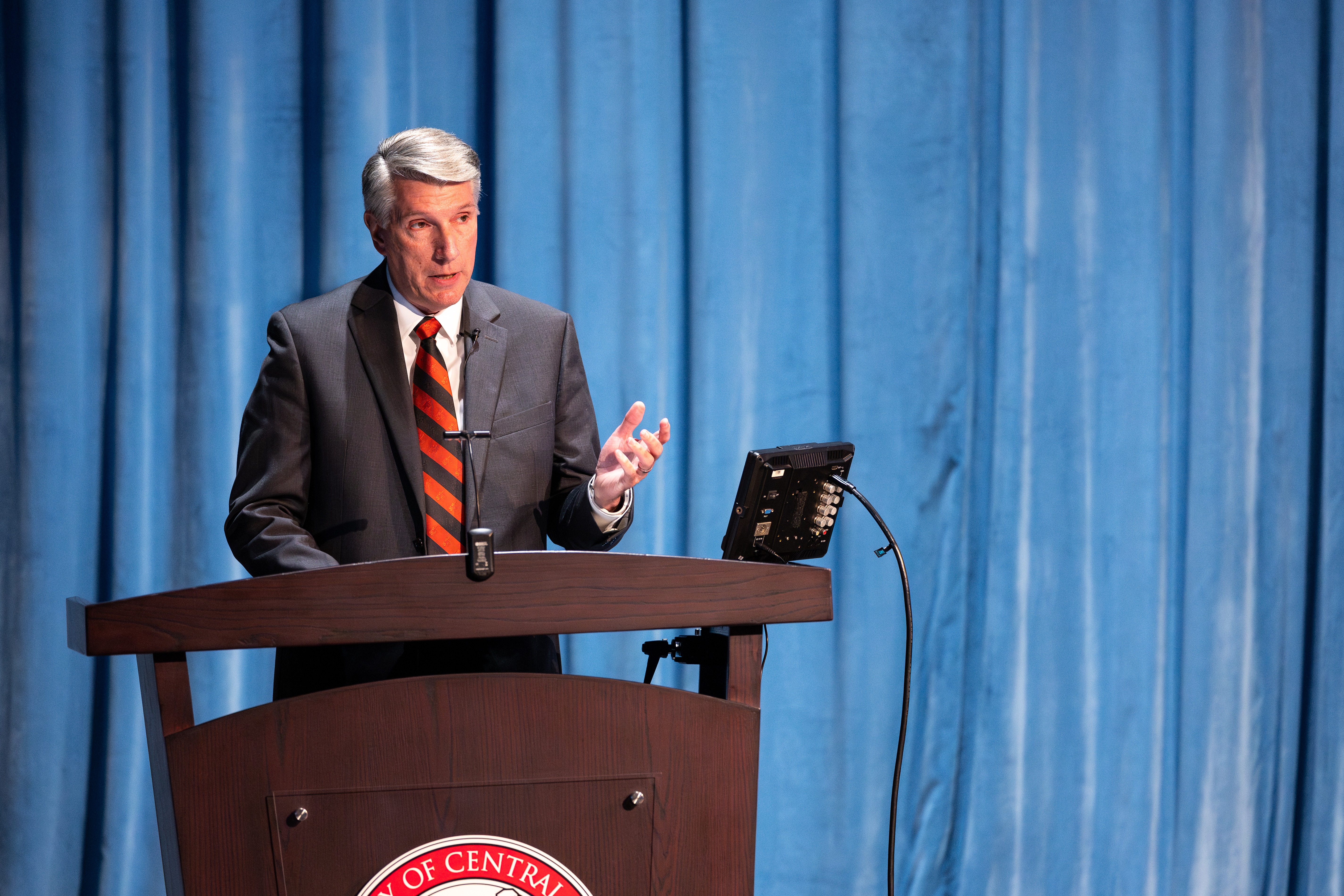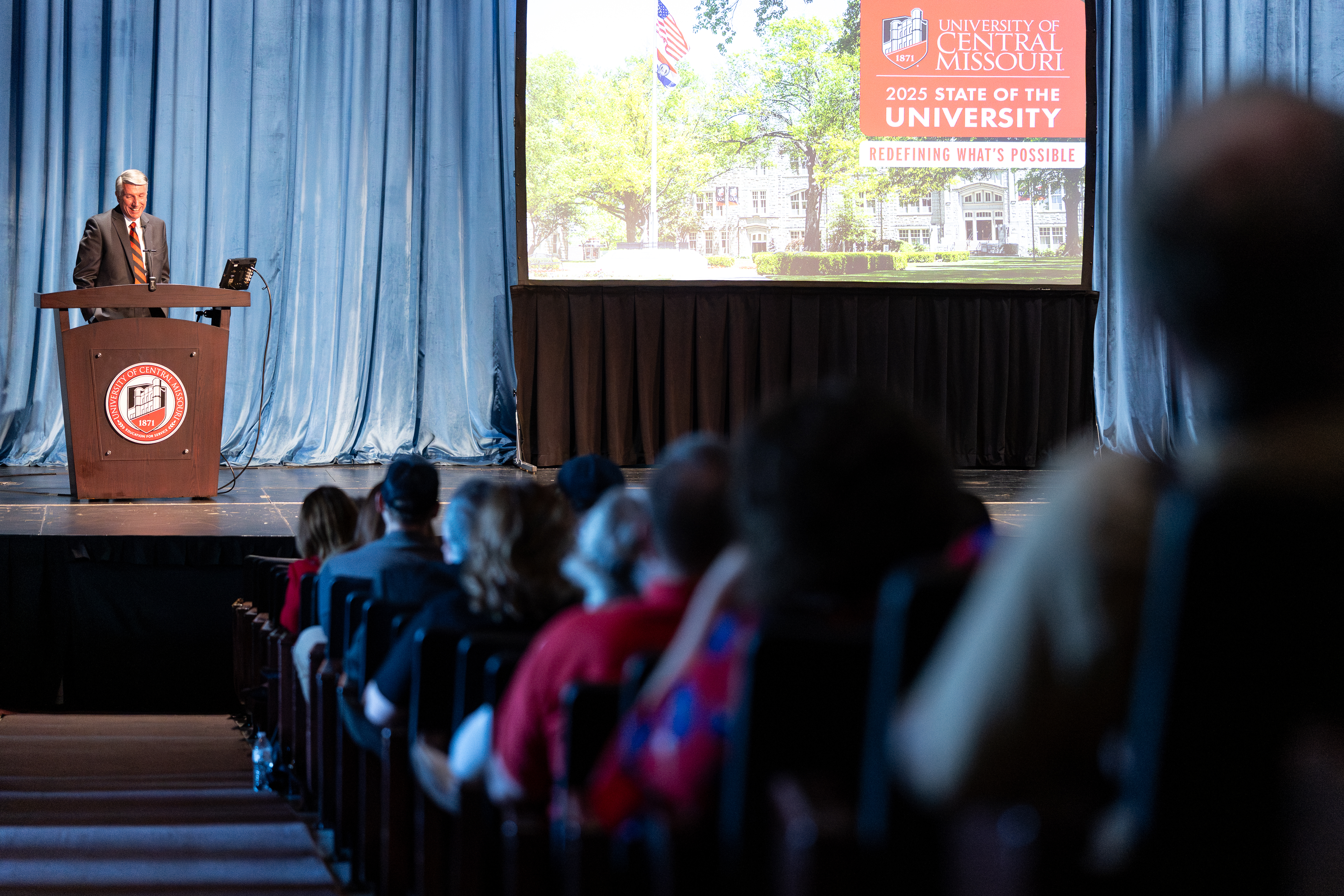Breadcrumb
President Best Keeps UCM Future-Focused in State of the University Address
By Nicole Lyons, October 7, 2025
 UCM President Roger Best delivers his eighth State of the University address on Thursday,
Oct. 2, in Hendricks Hall.
UCM President Roger Best delivers his eighth State of the University address on Thursday,
Oct. 2, in Hendricks Hall.
Change and the challenges it brings are common in every era of higher education, and 2025 is no different. During his eighth State of the University address on Thursday, Oct. 2, University of Central Missouri (UCM) President Roger Best focused on the future and how the university can adapt to an ever-changing environment.
“In every era of higher education, there have been challenges, whether financial,
technological, governmental or societal. And, at times, we have had to deal with challenges
from all of these sources simultaneously,” Best said, offering examples such as when
the internet was feared as a disruptor to higher education in 2000.
As the university positions itself to adapt to its current set of challenges, Best
reminded those gathered in Hendricks Hall and watching the livestream why their work matters. During the last fiscal year, the UCM Alumni Foundation brought in $7.4 million and alumni engaged with UCM at record levels. Traditional
freshman enrollment is up compared to 2024. Students report feeling a strong sense
of community at UCM and that faculty and staff are supportive and encouraging.
“It was another great year here at UCM, but none of this happened by accident,” Best said. “Our collective hard work in taking action through well-thought-out strategies and our continual focus on our students and their success has led to this pretty good place in which we find ourselves.
“And as much as we might like this place, we know that we cannot continue to thrive by simply relying on where we have been and staying where we are. Even in the midst of the changes that higher education is experiencing, what lies before us is incredible opportunity. To take advantage of these opportunities, not surprisingly, we have some work to do. And I am eager to partner with you in those efforts.”
Best offered five areas of focus for the coming year and beyond – enrollment growth, financial viability and sustainability, infrastructure improvements, external relations and partnerships, and alumni and foundation engagement – and centered his address around the first three.
Enrollment Growth
First-time freshman enrollment is up 8.8% this fall compared to 2024, and undergraduate
transfer student numbers increased 4.2%. While undergraduate international student
enrollment is up more than 14% compared to last fall, graduate international enrollment
has declined. Within UCM’s population, students come from 107 of Missouri’s 114 counties,
48 of the 50 U.S. states and 58 other countries.
“As we move forward, we will continue to deploy those recruitment approaches that
have been working, and we will also carefully redevelop and refine specific strategies
for each of the enrollment segments the university serves,” he said. “We will also
create ways to target new segments, and most importantly, we will take actions to
foster growth in existing and emerging segments.”
Best offered a number of strategies, including growing Direct Connect partnerships with community colleges, ensuring courses are provided in modalities
that make sense for students, and expanding dual-degree and dual-credit agreements.
Financial Viability and Sustainability
“We have designed a budget process that insulates us to a degree from swings in enrollment,
but it’s critical that we rely on more than just budget design,” Best said as he introduced
initiatives and concepts to improve financial security, including:
-
Become a fully AI-enabled university
-
Continual review of compensation and benefits and deployment of resources
-
Continuation of academic program health assessments
-
Optimal curriculum design and course scheduling
-
Updating policies and procedures and ensuring operating compliance
Infrastructure Improvements
Over the last eight fiscal years, including Fiscal Year 2026, UCM has invested more
than $100 million in capital improvements. Best announced that over the next three
years, the university intends to invest more than $130 million in more than a dozen
identified capital projects encompassing a broad cross-section of campus.
Planned infrastructure improvements include:
-
The rebuild of Yeater Hall
-
Construction of a new Welcome Center
-
A significant facelift for the Grinstead and Utt buildings
-
Completion of major upgrades to facilities for the wrestling and volleyball programs in the Jerry M. Hughes Athletics Center
-
A new storage facility for the Marching Mules next to East Field
-
Demolition of the University Conference Center and Hudson Hall
-
Additional renovations to Hendricks Hall
-
Relocation of the Blackbox Theatre from Nickerson Hall to what is currently Twomey Auditorium in the Wood Building
-
Significant improvements to the softball and soccer facilities at the Southeast Recreation Complex
-
Renovations to the Welch-Schmidt Center for Communications Disorders
-
Renovations to the Marriage and Family Therapy Clinic
-
Repurposing the building at 535 S. Maguire St.
Several additional projects will be announced at a later date.
Best said the goal is to have all projects completed or near completion within the
next three years. Funding will come from multiple sources, including funds accrued
by UCM Housing and the university, gifts through the UCM Alumni Foundation, grants,
and long-term debt through bond issuance.
On the technology side, Best said the university must take advantage of current and
emerging artificial intelligence-based (AI) tools and software programs to enhance
its work even further. UCM is in the final stages of developing a roadmap to facilitate
a structured approach, and Best has asked the President’s Council members to explore
AI-based programs for their areas.
“AI-based tools that we already have access to here at UCM have the potential to transform what and how we instruct, how and how well our students learn, and our actual operating environment,” he said.
As he concluded his remarks, Best reminded every employee that they each play a vital role in providing better futures for UCM students. He encouraged everyone to be curious and to be a problem solver, not a problem creator.
“I cannot predict the future. But I can predict that if we don’t adapt, we will quickly find ourselves to be irrelevant,” Best said. “… But there is a way forward without fear. And it occurs through preparation and adaptation.”
 Members of the campus community listen to the State of the University address in Hendricks
Hall.
Members of the campus community listen to the State of the University address in Hendricks
Hall.








